期末易错专项:04阅读判断-英语六年级上册译林版(三起)(含答案)
文档属性
| 名称 | 期末易错专项:04阅读判断-英语六年级上册译林版(三起)(含答案) | 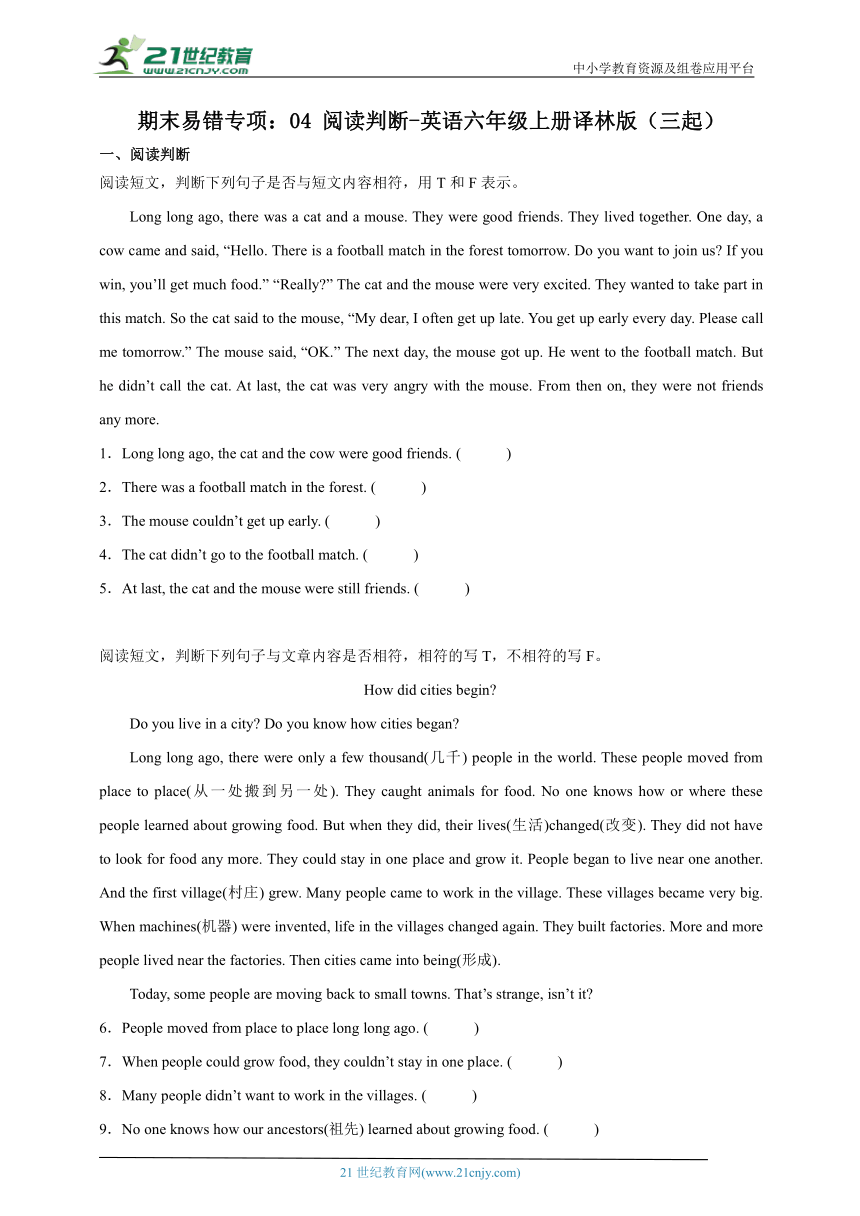 | |
| 格式 | docx | ||
| 文件大小 | 1.1MB | ||
| 资源类型 | 试卷 | ||
| 版本资源 | 牛津译林版 | ||
| 科目 | 英语 | ||
| 更新时间 | 2023-12-11 16:50:06 | ||
图片预览

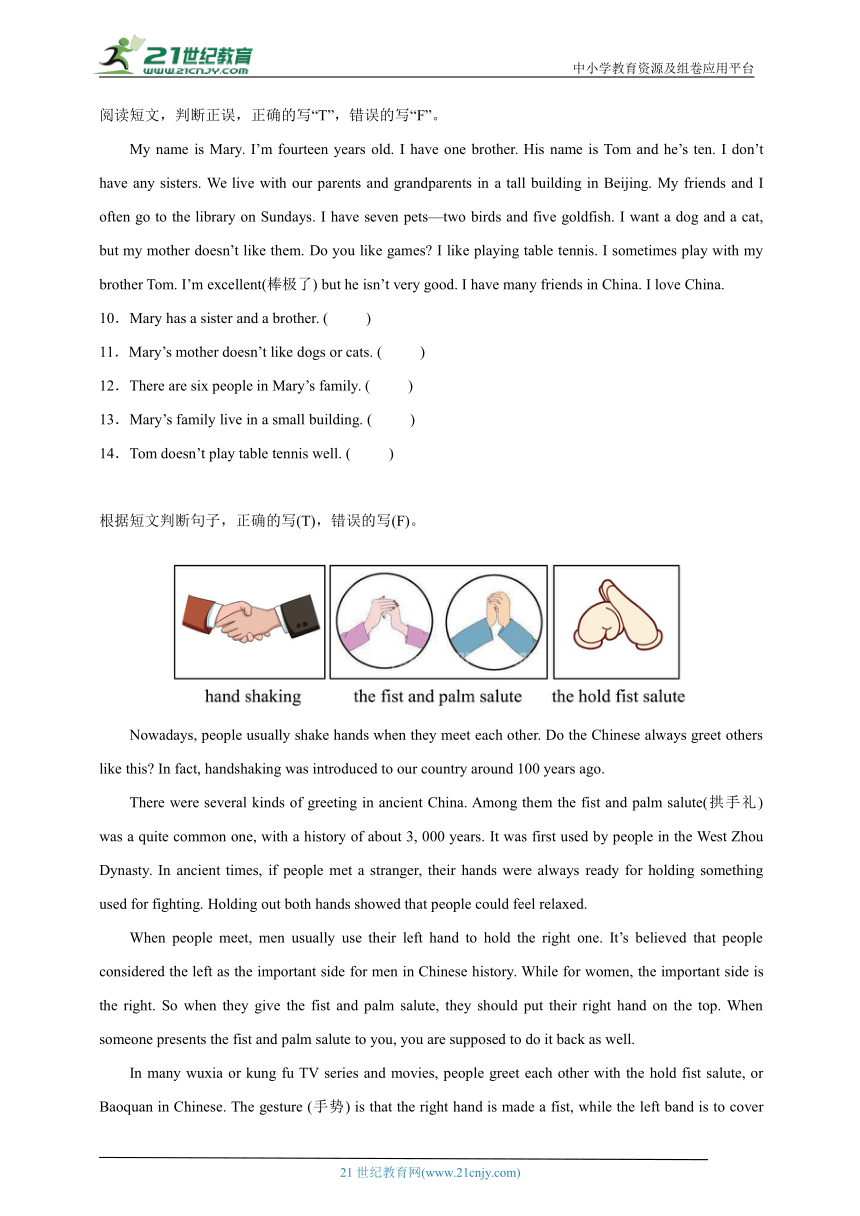
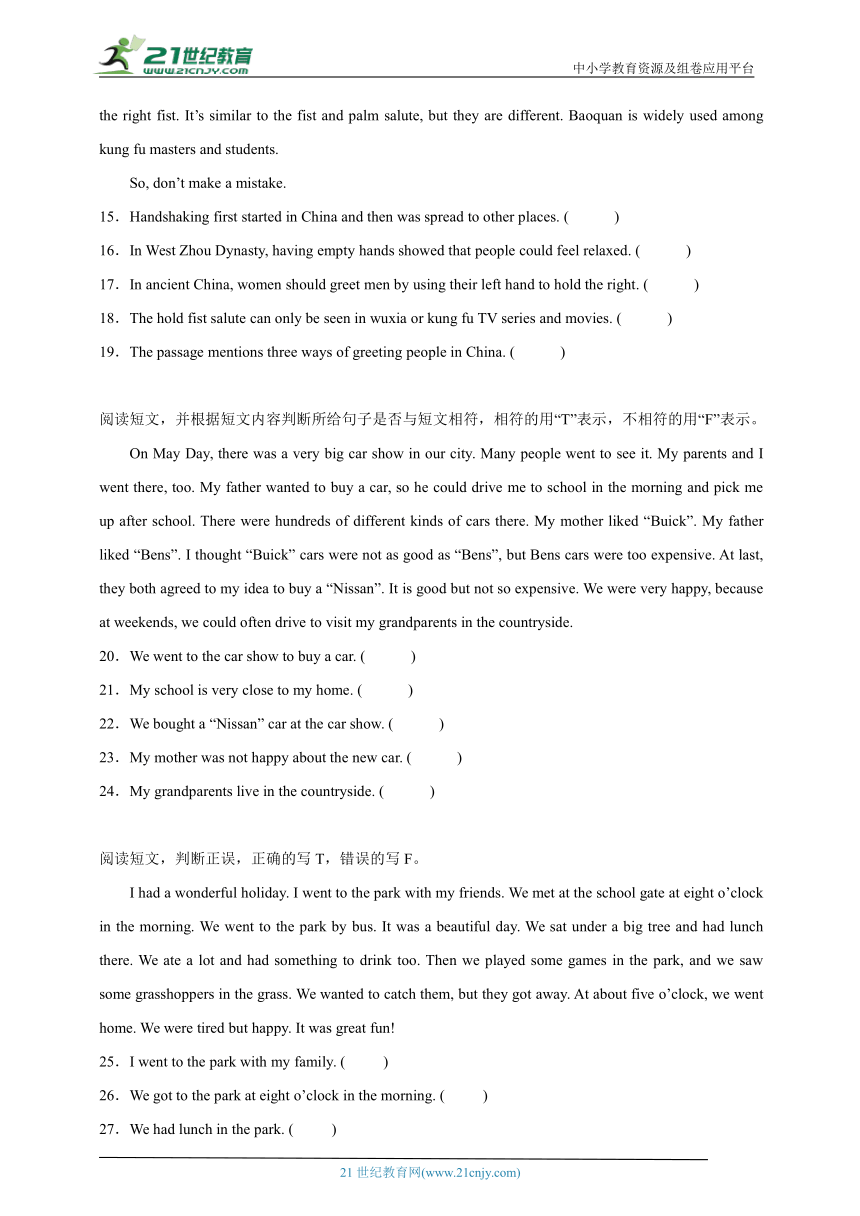
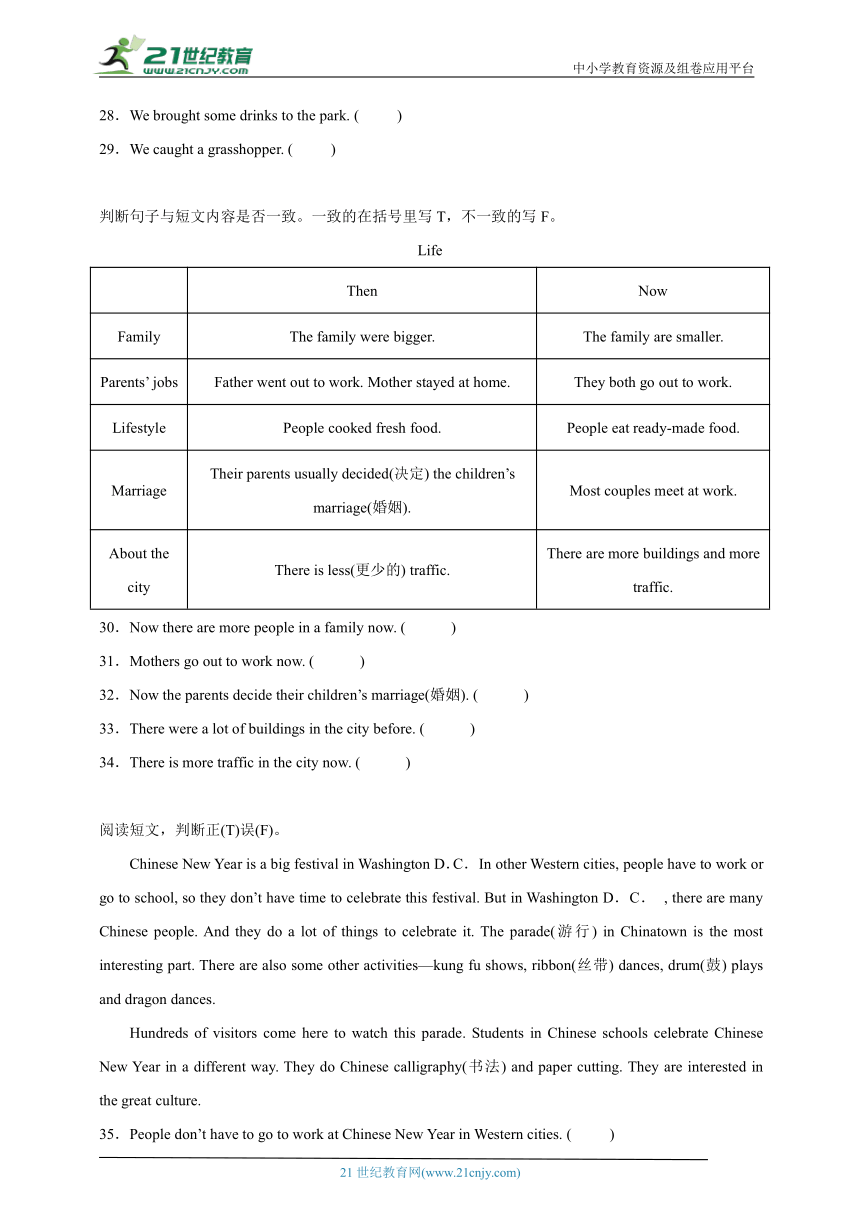
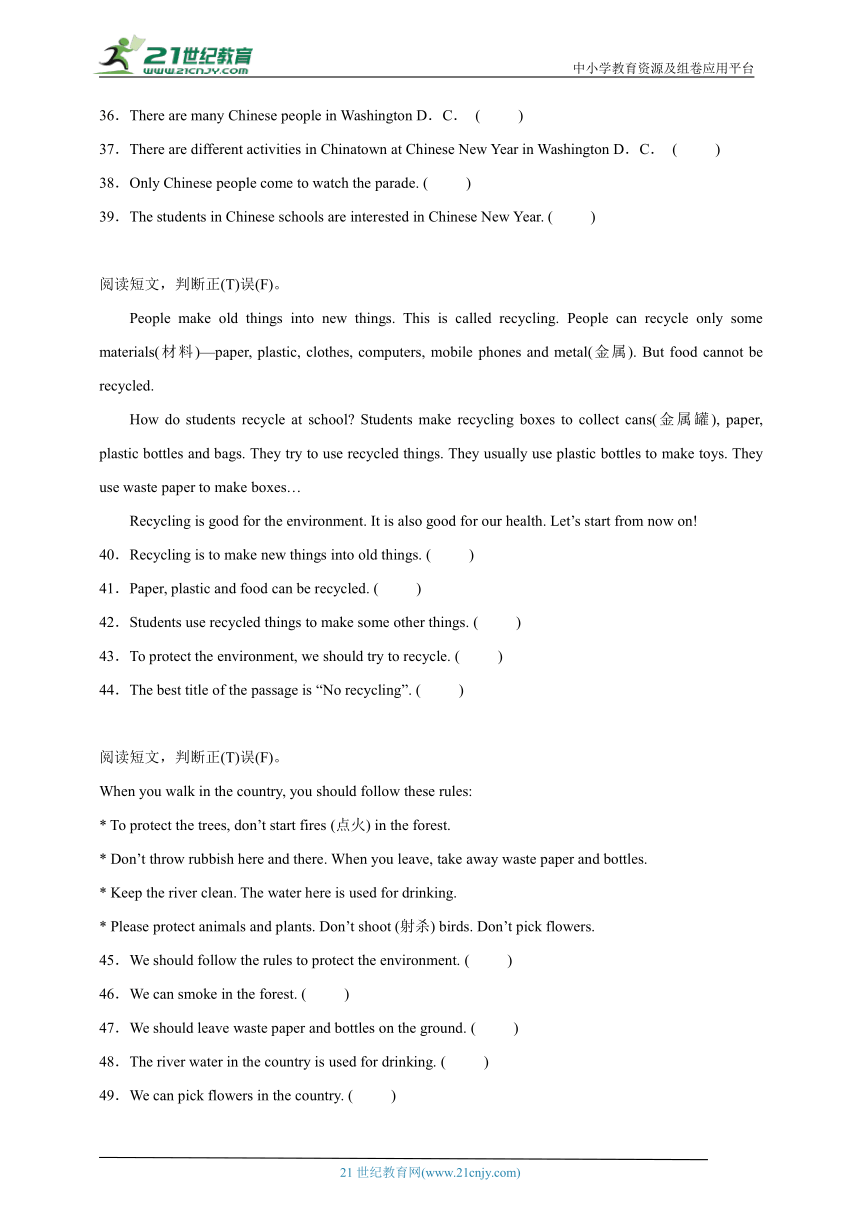
文档简介
中小学教育资源及组卷应用平台
期末易错专项:04 阅读判断-英语六年级上册译林版(三起)
一、阅读判断
阅读短文,判断下列句子是否与短文内容相符,用T和F表示。
Long long ago, there was a cat and a mouse. They were good friends. They lived together. One day, a cow came and said, “Hello. There is a football match in the forest tomorrow. Do you want to join us If you win, you’ll get much food.” “Really ” The cat and the mouse were very excited. They wanted to take part in this match. So the cat said to the mouse, “My dear, I often get up late. You get up early every day. Please call me tomorrow.” The mouse said, “OK.” The next day, the mouse got up. He went to the football match. But he didn’t call the cat. At last, the cat was very angry with the mouse. From then on, they were not friends any more.
1.Long long ago, the cat and the cow were good friends. ( )
2.There was a football match in the forest. ( )
3.The mouse couldn’t get up early. ( )
4.The cat didn’t go to the football match. ( )
5.At last, the cat and the mouse were still friends. ( )
阅读短文,判断下列句子与文章内容是否相符,相符的写T,不相符的写F。
How did cities begin
Do you live in a city Do you know how cities began
Long long ago, there were only a few thousand(几千) people in the world. These people moved from place to place(从一处搬到另一处). They caught animals for food. No one knows how or where these people learned about growing food. But when they did, their lives(生活)changed(改变). They did not have to look for food any more. They could stay in one place and grow it. People began to live near one another. And the first village(村庄) grew. Many people came to work in the village. These villages became very big. When machines(机器) were invented, life in the villages changed again. They built factories. More and more people lived near the factories. Then cities came into being(形成).
Today, some people are moving back to small towns. That’s strange, isn’t it
6.People moved from place to place long long ago. ( )
7.When people could grow food, they couldn’t stay in one place. ( )
8.Many people didn’t want to work in the villages. ( )
9.No one knows how our ancestors(祖先) learned about growing food. ( )
阅读短文,判断正误,正确的写“T”,错误的写“F”。
My name is Mary. I’m fourteen years old. I have one brother. His name is Tom and he’s ten. I don’t have any sisters. We live with our parents and grandparents in a tall building in Beijing. My friends and I often go to the library on Sundays. I have seven pets—two birds and five goldfish. I want a dog and a cat, but my mother doesn’t like them. Do you like games I like playing table tennis. I sometimes play with my brother Tom. I’m excellent(棒极了) but he isn’t very good. I have many friends in China. I love China.
10.Mary has a sister and a brother. ( )
11.Mary’s mother doesn’t like dogs or cats. ( )
12.There are six people in Mary’s family. ( )
13.Mary’s family live in a small building. ( )
14.Tom doesn’t play table tennis well. ( )
根据短文判断句子,正确的写(T),错误的写(F)。
Nowadays, people usually shake hands when they meet each other. Do the Chinese always greet others like this In fact, handshaking was introduced to our country around 100 years ago.
There were several kinds of greeting in ancient China. Among them the fist and palm salute(拱手礼) was a quite common one, with a history of about 3, 000 years. It was first used by people in the West Zhou Dynasty. In ancient times, if people met a stranger, their hands were always ready for holding something used for fighting. Holding out both hands showed that people could feel relaxed.
When people meet, men usually use their left hand to hold the right one. It’s believed that people considered the left as the important side for men in Chinese history. While for women, the important side is the right. So when they give the fist and palm salute, they should put their right hand on the top. When someone presents the fist and palm salute to you, you are supposed to do it back as well.
In many wuxia or kung fu TV series and movies, people greet each other with the hold fist salute, or Baoquan in Chinese. The gesture (手势) is that the right hand is made a fist, while the left band is to cover the right fist. It’s similar to the fist and palm salute, but they are different. Baoquan is widely used among kung fu masters and students.
So, don’t make a mistake.
15.Handshaking first started in China and then was spread to other places. ( )
16.In West Zhou Dynasty, having empty hands showed that people could feel relaxed. ( )
17.In ancient China, women should greet men by using their left hand to hold the right. ( )
18.The hold fist salute can only be seen in wuxia or kung fu TV series and movies. ( )
19.The passage mentions three ways of greeting people in China. ( )
阅读短文,并根据短文内容判断所给句子是否与短文相符,相符的用“T”表示,不相符的用“F”表示。
On May Day, there was a very big car show in our city. Many people went to see it. My parents and I went there, too. My father wanted to buy a car, so he could drive me to school in the morning and pick me up after school. There were hundreds of different kinds of cars there. My mother liked “Buick”. My father liked “Bens”. I thought “Buick” cars were not as good as “Bens”, but Bens cars were too expensive. At last, they both agreed to my idea to buy a “Nissan”. It is good but not so expensive. We were very happy, because at weekends, we could often drive to visit my grandparents in the countryside.
20.We went to the car show to buy a car. ( )
21.My school is very close to my home. ( )
22.We bought a “Nissan” car at the car show. ( )
23.My mother was not happy about the new car. ( )
24.My grandparents live in the countryside. ( )
阅读短文,判断正误,正确的写T,错误的写F。
I had a wonderful holiday. I went to the park with my friends. We met at the school gate at eight o’clock in the morning. We went to the park by bus. It was a beautiful day. We sat under a big tree and had lunch there. We ate a lot and had something to drink too. Then we played some games in the park, and we saw some grasshoppers in the grass. We wanted to catch them, but they got away. At about five o’clock, we went home. We were tired but happy. It was great fun!
25.I went to the park with my family. ( )
26.We got to the park at eight o’clock in the morning. ( )
27.We had lunch in the park. ( )
28.We brought some drinks to the park. ( )
29.We caught a grasshopper. ( )
判断句子与短文内容是否一致。一致的在括号里写T,不一致的写F。
Life
Then Now
Family The family were bigger. The family are smaller.
Parents’ jobs Father went out to work. Mother stayed at home. They both go out to work.
Lifestyle People cooked fresh food. People eat ready-made food.
Marriage Their parents usually decided(决定) the children’s marriage(婚姻). Most couples meet at work.
About the city There is less(更少的) traffic. There are more buildings and more traffic.
30.Now there are more people in a family now. ( )
31.Mothers go out to work now. ( )
32.Now the parents decide their children’s marriage(婚姻). ( )
33.There were a lot of buildings in the city before. ( )
34.There is more traffic in the city now. ( )
阅读短文,判断正(T)误(F)。
Chinese New Year is a big festival in Washington D.C. In other Western cities, people have to work or go to school, so they don’t have time to celebrate this festival. But in Washington D.C. , there are many Chinese people. And they do a lot of things to celebrate it. The parade(游行) in Chinatown is the most interesting part. There are also some other activities—kung fu shows, ribbon(丝带) dances, drum(鼓) plays and dragon dances.
Hundreds of visitors come here to watch this parade. Students in Chinese schools celebrate Chinese New Year in a different way. They do Chinese calligraphy(书法) and paper cutting. They are interested in the great culture.
35.People don’t have to go to work at Chinese New Year in Western cities. ( )
36.There are many Chinese people in Washington D.C. ( )
37.There are different activities in Chinatown at Chinese New Year in Washington D.C. ( )
38.Only Chinese people come to watch the parade. ( )
39.The students in Chinese schools are interested in Chinese New Year. ( )
阅读短文,判断正(T)误(F)。
People make old things into new things. This is called recycling. People can recycle only some materials(材料)—paper, plastic, clothes, computers, mobile phones and metal(金属). But food cannot be recycled.
How do students recycle at school Students make recycling boxes to collect cans(金属罐), paper, plastic bottles and bags. They try to use recycled things. They usually use plastic bottles to make toys. They use waste paper to make boxes…
Recycling is good for the environment. It is also good for our health. Let’s start from now on!
40.Recycling is to make new things into old things. ( )
41.Paper, plastic and food can be recycled. ( )
42.Students use recycled things to make some other things. ( )
43.To protect the environment, we should try to recycle. ( )
44.The best title of the passage is “No recycling”. ( )
阅读短文,判断正(T)误(F)。
When you walk in the country, you should follow these rules:
* To protect the trees, don’t start fires (点火) in the forest.
* Don’t throw rubbish here and there. When you leave, take away waste paper and bottles.
* Keep the river clean. The water here is used for drinking.
* Please protect animals and plants. Don’t shoot (射杀) birds. Don’t pick flowers.
45.We should follow the rules to protect the environment. ( )
46.We can smoke in the forest. ( )
47.We should leave waste paper and bottles on the ground. ( )
48.The river water in the country is used for drinking. ( )
49.We can pick flowers in the country. ( )
参考答案:
1.F 2.F 3.F 4.T 5.F
【导语】导语:本文主要讲了老鼠和猫原来是好朋友,因一场足球比赛不再是朋友的故事。
1.句意:很久以前,猫和牛是好朋友。由“Long long ago, there was a cat and a mouse. They were good friends.”可知猫和老鼠是好朋友,题干描述与原文不符,故答案为F。
2.句意:在森林里有一场足球比赛。由“There is a football match in the forest tomorrow.”可知明天有足球比赛,原文是过去式,题干描述与原文不符,故答案为F。
3.句意:老鼠不能早起。由“You get up early every day.”可知老鼠每天早上都早起,题干描述与原文不符,故答案为F。
4.句意:猫没能去足球比赛。由“But he didn’t call the cat.”可知老鼠没有叫猫,猫没去足球比赛,题干描述与原文相符,故答案为T。
5.句意:最终,老鼠和猫仍然是朋友。由“From then on, they were not friends any more.”可知它们不再是朋友,题干描述与原文不符,故答案为F。
6.T 7.F 8.F 9.T
【导语】本文介绍了城市是如何开始的。
6.句意:人们很久以前就从一个地方搬到另一个地方。根据“Long long ago, there were only a few thousand people in the world. These people moved from place to place.”可知人们很久以前就从一个地方搬到另一个地方。与原文相符,故答案为T。
7.句意:当人们可以种植粮食时,他们就不能呆在一个地方了。根据“No one knows how or where these people learned about growing food. But when they did, their lives changed. They did not have to look for food any more. They could stay in one place and grow it.”可知他们不用再去找食物,可以待在一个地方种粮食。与原文不符,故答案为F。
8.句意:许多人不愿意到村庄去工作。根据“ Many people came to work in the village.”可知许多人都到村庄工作,与原文不符,故答案为F。
9.句意:没有人知道我们的祖先是如何学会种植食物的。根据“No one knows how or where these people learned about growing food.”可知没人知道我们的祖先是在哪儿以及如何学会种植粮食的,与原文相符,故答案为T。
10.F 11.T 12.T 13.F 14.T
【导语】本文主要介绍了玛丽及她的一家人。
10.句意:玛丽有一个姐姐和一个弟弟。根据文中句子“I have one brother. I don’t have any sisters.”可知玛丽有一个弟弟,没有姐姐,故答案为F。
11.句意:玛丽的妈妈不喜欢狗和猫。根据文中句子“I want a dog and a cat, but my mother doesn’t like them.”可知玛丽想要一只狗和一只猫,但是妈妈不喜欢它们,所以玛丽的妈妈不喜欢狗和猫,故答案为T。
12.句意:玛丽的家里有六口人。根据文中句子“I have one brother. We live with our parents and grandparents in a tall building in Beijing.”可知玛丽家里有玛丽、弟弟、爷爷奶奶和爸爸妈妈,一共六个人,故答案为T。
13.句意:玛丽的家人住在一栋小楼里。根据文中句子“We live with our parents and grandparents in a tall building in Beijing.”可知玛丽的家人住在一栋高楼里,故答案为F。
14.句意:汤姆乒乓球打得不好。根据文中句子“I like playing table tennis. I sometimes play with my brother Tom. I’m excellent(棒极了) but he isn’t very good.”可知汤姆乒乓球打得不好,故答案为T。
15.F 16.T 17.F 18.F 19.F
【导语】本文讲述了中国人打招呼的几种方式。
15.句意:握手首先起源于中国,然后传播到其他地方。根据“In fact, handshaking was introduced to our country around 100 years ago. ”可知事实上,握手是大约100年前传入我国的,故答案为F。
16.句意:在西周,两手空空表明人们可以感到放松。根据“Holding out both hands showed that people could feel relaxed.”可知伸出双手表明人们可以感到放松,故答案为T。
17.句意:在中国古代,女性应该用左手握住右手与男性打招呼。根据“When people meet, men usually use their left hand to hold the right one.”可知当人们见面时,男人通常用左手握住右手,不是女性,故答案为F。
18.句意:握拳礼只能在武侠或功夫电视剧和电影中看到。根据文章可知,握拳礼是过去人们常用的打招呼方式,不仅存在于电视剧或电影中,故答案为F。
19.句意:这篇文章提到了中国人打招呼的三种方式。根据全文可知,文章中提到了hand shaking握手礼,the hold fist salute握拳礼,Baoquan抱拳礼,the fist and palm salute握拳和掌敬礼四种打招呼方式,故答案为F。
20.T 21.F 22.T 23.F 24.T
【导语】本文主要介绍了我们全家去车展买车。
20.句意:我们去车展买车。根据“My father wanted to buy a car, so he could drive me to school in the morning and pick me up after school. ”可知他们去车展是为了买车。句子和短文内容相符,故答案为T。
21.句意:我的学校离我家非常近。根据“so he could drive me to school in the morning and pick me up after school. ”可知爸爸开车接送我上下学,学校离家应该是远,句子和短文内容不符,故答案为F。
22.句意:在车展,我们买了一辆“Nissan”车。根据“At last, they both agreed to my idea to buy a “Nissan”.”可知最后他们买了辆“Nissan”车。句子和短文内容相符,故答案为T。
23.句意:关于买新车,我的妈妈不开心。根据“We were very happy.”可知他们是开心的,句子和短文内容不符,故答案为F。
24.句意:我的祖父母住在农村。根据“We were very happy, because at weekends, we could often drive to visit my grandparents in the countryside.”可知周末,他们可以开车去看望在农村的祖父母,祖父母应该是住在农村。句子和短文内容相符,故答案为T。
25.F 26.F 27.T 28.T 29.F
【导语】本文主要写了一个假期我和朋友去公园玩的事情。
25.句意:我和家人一起去了公园。根据文中句子“I went to the park with my friends.”可知我和朋友一起去公园了,故答案为F。
26.句意:我们早上八点钟到达公园。根据文中句子“We met at the school gate at eight o’clock in the morning.”可知我们早上八点钟在学校门口见面,故答案为F。
27.句意:我们在公园吃午饭。根据文中句子“We sat under a big tree and had lunch there.”可知我们在公园里坐在一棵大树下吃午餐,故答案为T。
28.句意:我们带了一些饮料到公园。根据文中句子“We ate a lot and had something to drink too.”可知我们也带了饮料到公园,故答案为T。
29.句意:我们抓到一只蚱蜢。根据文中句子“Then we played some games in the park, and we saw some grasshoppers in the grass. We wanted to catch them, but they got away.”可知我们没有抓到蚱蜢,故答案为F。
30.F 31.T 32.F 33.F 34.T
【导语】表格描述了过去和现在人们生活的衣食住行的对比。
30.句意:现在有更多的人在一个家庭。根据“The family are smaller.”可知现在家庭更小了,没有很多人在一个家庭,故答案为F。
31.句意:母亲们现在外出工作。根据“They both go out to work.”可知现在父母都出去工作,母亲们也外出工作,故答案为T。
32.句意:现在由父母决定孩子的婚姻。根据“Most couples meet at work.”可知大多数情侣都是在工作中认识的,自由恋爱结婚,故答案为F。
33.句意:以前这个城市有很多建筑。根据“There are more buildings and more traffic.”可知现在的城市建筑很多,过去很少,故答案为F。
34.句意:现在城里的交通多了。根据“There are more buildings and more traffic.”可知现在城里的交通变得多了,故答案为T。
35.F 36.T 37.T 38.F 39.T
【导语】本文讲述了在华盛顿特区人们是如何庆祝中国新年的。
35.句意:在西方城市,人们在春节不用上班。根据“In other Western cities, people have to work or go to school, so they don’t have time to celebrate this festival. ”在其他西方城市,人们要上班或上学,所以他们没有时间庆祝这个节日。可知题干与原文不符,故答案为F。
36.句意:华盛顿特区有很多中国人。根据“But in Washington D.C. , there are many Chinese people.”可知题干描述正确,故答案为T。
37.句意:在华盛顿特区的中国新年,唐人街有不同的活动。根据“The parade(游行) in Chinatown is the most interesting part. There are also some other activities—kung fu shows, ribbon(丝带) dances, drum(鼓) plays and dragon dances.”在唐人街的游行是最有趣的部分。还有其他一些活动——功夫表演、彩带舞、鼓剧和舞龙。”可知题干描述正确,故答案为T。
38.句意:只有中国人来观看游行。根据“Hundreds of visitors come here to watch this parade.”可知数百名游客来这里观看游行。故题干与原文不符,故答案为F。
39.句意:中国学校的学生对中国新年很感兴趣。根据“Students in Chinese schools celebrate Chinese New Year in a different way. They do Chinese calligraphy(书法) and paper cutting. They are interested in the great culture.”中国学校的学生以不同的方式庆祝中国新年。他们做中国书法和剪纸。他们对伟大的文化感兴趣。可知题干描述正确,故答案为T。
40.F 41.F 42.T 43.T 44.F
【导语】本文讲述了我们为了保护环境,要做好回收工作。
40.句意:回收就是把新东西变成旧东西。根据“People make old things into new things. This is called recycling. ”可知回收是把旧东西变成新东西。故答案为F。
41.句意:纸张、塑料和食物都可以回收利用。根据“People can recycle only some materials(材料)—paper, plastic, clothes, computers, mobile phones and metal(金属). But food cannot be recycled.”可是食物不能回收。故答案为F。
42.句意:学生们用回收的东西做一些其他的东西。根据“They usually use plastic bottles to make toys. They use waste paper to make boxes…”可知题干描述正确,故答案为T。
43.句意:为了保护环境,我们应该尽量回收利用。根据“Recycling is good for the environment. ”可知题干描述正确,故答案为T。
44.句意:这篇文章最好的标题是“不回收”。本文主要讲的是为了保护环境而回收。故答案为F。
45.T 46.F 47.F 48.T 49.F
【导语】本文主要介绍了在农村漫步,应该遵循的规则。
45.句意:我们应该按着规则来保护环境。本文列举了一些规则,都是有关环境保护的,句子和短文内容相符,故答案为T。
46.句意:我们可以在森林里吸烟。根据“To protect the trees, don’t start fires (点火) in the forest.”可知不能在森林里点火,也就是不能吸烟,句子和短文内容不符,故答案为F。
47.句意:我们应该把废纸和瓶子留在地面上。根据“When you leave, take away waste paper and bottles.”可知当你离开的时候,把废纸和瓶子带走,不能留在地面上,句子和短文内容不符,故答案为F。
48.句意:在农村,河水是用来喝的。根据“Keep the river clean. The water here is used for drinking.”可知农村的河水是用来喝的,句子和短文内容相符,故答案为T。
49.句意:我们可以在农村摘花。根据“Don’t pick flowers.”可知不能摘花,句子和短文内容不符,故答案为F。
21世纪教育网 www.21cnjy.com 精品试卷·第 2 页 (共 2 页)
21世纪教育网(www.21cnjy.com)
期末易错专项:04 阅读判断-英语六年级上册译林版(三起)
一、阅读判断
阅读短文,判断下列句子是否与短文内容相符,用T和F表示。
Long long ago, there was a cat and a mouse. They were good friends. They lived together. One day, a cow came and said, “Hello. There is a football match in the forest tomorrow. Do you want to join us If you win, you’ll get much food.” “Really ” The cat and the mouse were very excited. They wanted to take part in this match. So the cat said to the mouse, “My dear, I often get up late. You get up early every day. Please call me tomorrow.” The mouse said, “OK.” The next day, the mouse got up. He went to the football match. But he didn’t call the cat. At last, the cat was very angry with the mouse. From then on, they were not friends any more.
1.Long long ago, the cat and the cow were good friends. ( )
2.There was a football match in the forest. ( )
3.The mouse couldn’t get up early. ( )
4.The cat didn’t go to the football match. ( )
5.At last, the cat and the mouse were still friends. ( )
阅读短文,判断下列句子与文章内容是否相符,相符的写T,不相符的写F。
How did cities begin
Do you live in a city Do you know how cities began
Long long ago, there were only a few thousand(几千) people in the world. These people moved from place to place(从一处搬到另一处). They caught animals for food. No one knows how or where these people learned about growing food. But when they did, their lives(生活)changed(改变). They did not have to look for food any more. They could stay in one place and grow it. People began to live near one another. And the first village(村庄) grew. Many people came to work in the village. These villages became very big. When machines(机器) were invented, life in the villages changed again. They built factories. More and more people lived near the factories. Then cities came into being(形成).
Today, some people are moving back to small towns. That’s strange, isn’t it
6.People moved from place to place long long ago. ( )
7.When people could grow food, they couldn’t stay in one place. ( )
8.Many people didn’t want to work in the villages. ( )
9.No one knows how our ancestors(祖先) learned about growing food. ( )
阅读短文,判断正误,正确的写“T”,错误的写“F”。
My name is Mary. I’m fourteen years old. I have one brother. His name is Tom and he’s ten. I don’t have any sisters. We live with our parents and grandparents in a tall building in Beijing. My friends and I often go to the library on Sundays. I have seven pets—two birds and five goldfish. I want a dog and a cat, but my mother doesn’t like them. Do you like games I like playing table tennis. I sometimes play with my brother Tom. I’m excellent(棒极了) but he isn’t very good. I have many friends in China. I love China.
10.Mary has a sister and a brother. ( )
11.Mary’s mother doesn’t like dogs or cats. ( )
12.There are six people in Mary’s family. ( )
13.Mary’s family live in a small building. ( )
14.Tom doesn’t play table tennis well. ( )
根据短文判断句子,正确的写(T),错误的写(F)。
Nowadays, people usually shake hands when they meet each other. Do the Chinese always greet others like this In fact, handshaking was introduced to our country around 100 years ago.
There were several kinds of greeting in ancient China. Among them the fist and palm salute(拱手礼) was a quite common one, with a history of about 3, 000 years. It was first used by people in the West Zhou Dynasty. In ancient times, if people met a stranger, their hands were always ready for holding something used for fighting. Holding out both hands showed that people could feel relaxed.
When people meet, men usually use their left hand to hold the right one. It’s believed that people considered the left as the important side for men in Chinese history. While for women, the important side is the right. So when they give the fist and palm salute, they should put their right hand on the top. When someone presents the fist and palm salute to you, you are supposed to do it back as well.
In many wuxia or kung fu TV series and movies, people greet each other with the hold fist salute, or Baoquan in Chinese. The gesture (手势) is that the right hand is made a fist, while the left band is to cover the right fist. It’s similar to the fist and palm salute, but they are different. Baoquan is widely used among kung fu masters and students.
So, don’t make a mistake.
15.Handshaking first started in China and then was spread to other places. ( )
16.In West Zhou Dynasty, having empty hands showed that people could feel relaxed. ( )
17.In ancient China, women should greet men by using their left hand to hold the right. ( )
18.The hold fist salute can only be seen in wuxia or kung fu TV series and movies. ( )
19.The passage mentions three ways of greeting people in China. ( )
阅读短文,并根据短文内容判断所给句子是否与短文相符,相符的用“T”表示,不相符的用“F”表示。
On May Day, there was a very big car show in our city. Many people went to see it. My parents and I went there, too. My father wanted to buy a car, so he could drive me to school in the morning and pick me up after school. There were hundreds of different kinds of cars there. My mother liked “Buick”. My father liked “Bens”. I thought “Buick” cars were not as good as “Bens”, but Bens cars were too expensive. At last, they both agreed to my idea to buy a “Nissan”. It is good but not so expensive. We were very happy, because at weekends, we could often drive to visit my grandparents in the countryside.
20.We went to the car show to buy a car. ( )
21.My school is very close to my home. ( )
22.We bought a “Nissan” car at the car show. ( )
23.My mother was not happy about the new car. ( )
24.My grandparents live in the countryside. ( )
阅读短文,判断正误,正确的写T,错误的写F。
I had a wonderful holiday. I went to the park with my friends. We met at the school gate at eight o’clock in the morning. We went to the park by bus. It was a beautiful day. We sat under a big tree and had lunch there. We ate a lot and had something to drink too. Then we played some games in the park, and we saw some grasshoppers in the grass. We wanted to catch them, but they got away. At about five o’clock, we went home. We were tired but happy. It was great fun!
25.I went to the park with my family. ( )
26.We got to the park at eight o’clock in the morning. ( )
27.We had lunch in the park. ( )
28.We brought some drinks to the park. ( )
29.We caught a grasshopper. ( )
判断句子与短文内容是否一致。一致的在括号里写T,不一致的写F。
Life
Then Now
Family The family were bigger. The family are smaller.
Parents’ jobs Father went out to work. Mother stayed at home. They both go out to work.
Lifestyle People cooked fresh food. People eat ready-made food.
Marriage Their parents usually decided(决定) the children’s marriage(婚姻). Most couples meet at work.
About the city There is less(更少的) traffic. There are more buildings and more traffic.
30.Now there are more people in a family now. ( )
31.Mothers go out to work now. ( )
32.Now the parents decide their children’s marriage(婚姻). ( )
33.There were a lot of buildings in the city before. ( )
34.There is more traffic in the city now. ( )
阅读短文,判断正(T)误(F)。
Chinese New Year is a big festival in Washington D.C. In other Western cities, people have to work or go to school, so they don’t have time to celebrate this festival. But in Washington D.C. , there are many Chinese people. And they do a lot of things to celebrate it. The parade(游行) in Chinatown is the most interesting part. There are also some other activities—kung fu shows, ribbon(丝带) dances, drum(鼓) plays and dragon dances.
Hundreds of visitors come here to watch this parade. Students in Chinese schools celebrate Chinese New Year in a different way. They do Chinese calligraphy(书法) and paper cutting. They are interested in the great culture.
35.People don’t have to go to work at Chinese New Year in Western cities. ( )
36.There are many Chinese people in Washington D.C. ( )
37.There are different activities in Chinatown at Chinese New Year in Washington D.C. ( )
38.Only Chinese people come to watch the parade. ( )
39.The students in Chinese schools are interested in Chinese New Year. ( )
阅读短文,判断正(T)误(F)。
People make old things into new things. This is called recycling. People can recycle only some materials(材料)—paper, plastic, clothes, computers, mobile phones and metal(金属). But food cannot be recycled.
How do students recycle at school Students make recycling boxes to collect cans(金属罐), paper, plastic bottles and bags. They try to use recycled things. They usually use plastic bottles to make toys. They use waste paper to make boxes…
Recycling is good for the environment. It is also good for our health. Let’s start from now on!
40.Recycling is to make new things into old things. ( )
41.Paper, plastic and food can be recycled. ( )
42.Students use recycled things to make some other things. ( )
43.To protect the environment, we should try to recycle. ( )
44.The best title of the passage is “No recycling”. ( )
阅读短文,判断正(T)误(F)。
When you walk in the country, you should follow these rules:
* To protect the trees, don’t start fires (点火) in the forest.
* Don’t throw rubbish here and there. When you leave, take away waste paper and bottles.
* Keep the river clean. The water here is used for drinking.
* Please protect animals and plants. Don’t shoot (射杀) birds. Don’t pick flowers.
45.We should follow the rules to protect the environment. ( )
46.We can smoke in the forest. ( )
47.We should leave waste paper and bottles on the ground. ( )
48.The river water in the country is used for drinking. ( )
49.We can pick flowers in the country. ( )
参考答案:
1.F 2.F 3.F 4.T 5.F
【导语】导语:本文主要讲了老鼠和猫原来是好朋友,因一场足球比赛不再是朋友的故事。
1.句意:很久以前,猫和牛是好朋友。由“Long long ago, there was a cat and a mouse. They were good friends.”可知猫和老鼠是好朋友,题干描述与原文不符,故答案为F。
2.句意:在森林里有一场足球比赛。由“There is a football match in the forest tomorrow.”可知明天有足球比赛,原文是过去式,题干描述与原文不符,故答案为F。
3.句意:老鼠不能早起。由“You get up early every day.”可知老鼠每天早上都早起,题干描述与原文不符,故答案为F。
4.句意:猫没能去足球比赛。由“But he didn’t call the cat.”可知老鼠没有叫猫,猫没去足球比赛,题干描述与原文相符,故答案为T。
5.句意:最终,老鼠和猫仍然是朋友。由“From then on, they were not friends any more.”可知它们不再是朋友,题干描述与原文不符,故答案为F。
6.T 7.F 8.F 9.T
【导语】本文介绍了城市是如何开始的。
6.句意:人们很久以前就从一个地方搬到另一个地方。根据“Long long ago, there were only a few thousand people in the world. These people moved from place to place.”可知人们很久以前就从一个地方搬到另一个地方。与原文相符,故答案为T。
7.句意:当人们可以种植粮食时,他们就不能呆在一个地方了。根据“No one knows how or where these people learned about growing food. But when they did, their lives changed. They did not have to look for food any more. They could stay in one place and grow it.”可知他们不用再去找食物,可以待在一个地方种粮食。与原文不符,故答案为F。
8.句意:许多人不愿意到村庄去工作。根据“ Many people came to work in the village.”可知许多人都到村庄工作,与原文不符,故答案为F。
9.句意:没有人知道我们的祖先是如何学会种植食物的。根据“No one knows how or where these people learned about growing food.”可知没人知道我们的祖先是在哪儿以及如何学会种植粮食的,与原文相符,故答案为T。
10.F 11.T 12.T 13.F 14.T
【导语】本文主要介绍了玛丽及她的一家人。
10.句意:玛丽有一个姐姐和一个弟弟。根据文中句子“I have one brother. I don’t have any sisters.”可知玛丽有一个弟弟,没有姐姐,故答案为F。
11.句意:玛丽的妈妈不喜欢狗和猫。根据文中句子“I want a dog and a cat, but my mother doesn’t like them.”可知玛丽想要一只狗和一只猫,但是妈妈不喜欢它们,所以玛丽的妈妈不喜欢狗和猫,故答案为T。
12.句意:玛丽的家里有六口人。根据文中句子“I have one brother. We live with our parents and grandparents in a tall building in Beijing.”可知玛丽家里有玛丽、弟弟、爷爷奶奶和爸爸妈妈,一共六个人,故答案为T。
13.句意:玛丽的家人住在一栋小楼里。根据文中句子“We live with our parents and grandparents in a tall building in Beijing.”可知玛丽的家人住在一栋高楼里,故答案为F。
14.句意:汤姆乒乓球打得不好。根据文中句子“I like playing table tennis. I sometimes play with my brother Tom. I’m excellent(棒极了) but he isn’t very good.”可知汤姆乒乓球打得不好,故答案为T。
15.F 16.T 17.F 18.F 19.F
【导语】本文讲述了中国人打招呼的几种方式。
15.句意:握手首先起源于中国,然后传播到其他地方。根据“In fact, handshaking was introduced to our country around 100 years ago. ”可知事实上,握手是大约100年前传入我国的,故答案为F。
16.句意:在西周,两手空空表明人们可以感到放松。根据“Holding out both hands showed that people could feel relaxed.”可知伸出双手表明人们可以感到放松,故答案为T。
17.句意:在中国古代,女性应该用左手握住右手与男性打招呼。根据“When people meet, men usually use their left hand to hold the right one.”可知当人们见面时,男人通常用左手握住右手,不是女性,故答案为F。
18.句意:握拳礼只能在武侠或功夫电视剧和电影中看到。根据文章可知,握拳礼是过去人们常用的打招呼方式,不仅存在于电视剧或电影中,故答案为F。
19.句意:这篇文章提到了中国人打招呼的三种方式。根据全文可知,文章中提到了hand shaking握手礼,the hold fist salute握拳礼,Baoquan抱拳礼,the fist and palm salute握拳和掌敬礼四种打招呼方式,故答案为F。
20.T 21.F 22.T 23.F 24.T
【导语】本文主要介绍了我们全家去车展买车。
20.句意:我们去车展买车。根据“My father wanted to buy a car, so he could drive me to school in the morning and pick me up after school. ”可知他们去车展是为了买车。句子和短文内容相符,故答案为T。
21.句意:我的学校离我家非常近。根据“so he could drive me to school in the morning and pick me up after school. ”可知爸爸开车接送我上下学,学校离家应该是远,句子和短文内容不符,故答案为F。
22.句意:在车展,我们买了一辆“Nissan”车。根据“At last, they both agreed to my idea to buy a “Nissan”.”可知最后他们买了辆“Nissan”车。句子和短文内容相符,故答案为T。
23.句意:关于买新车,我的妈妈不开心。根据“We were very happy.”可知他们是开心的,句子和短文内容不符,故答案为F。
24.句意:我的祖父母住在农村。根据“We were very happy, because at weekends, we could often drive to visit my grandparents in the countryside.”可知周末,他们可以开车去看望在农村的祖父母,祖父母应该是住在农村。句子和短文内容相符,故答案为T。
25.F 26.F 27.T 28.T 29.F
【导语】本文主要写了一个假期我和朋友去公园玩的事情。
25.句意:我和家人一起去了公园。根据文中句子“I went to the park with my friends.”可知我和朋友一起去公园了,故答案为F。
26.句意:我们早上八点钟到达公园。根据文中句子“We met at the school gate at eight o’clock in the morning.”可知我们早上八点钟在学校门口见面,故答案为F。
27.句意:我们在公园吃午饭。根据文中句子“We sat under a big tree and had lunch there.”可知我们在公园里坐在一棵大树下吃午餐,故答案为T。
28.句意:我们带了一些饮料到公园。根据文中句子“We ate a lot and had something to drink too.”可知我们也带了饮料到公园,故答案为T。
29.句意:我们抓到一只蚱蜢。根据文中句子“Then we played some games in the park, and we saw some grasshoppers in the grass. We wanted to catch them, but they got away.”可知我们没有抓到蚱蜢,故答案为F。
30.F 31.T 32.F 33.F 34.T
【导语】表格描述了过去和现在人们生活的衣食住行的对比。
30.句意:现在有更多的人在一个家庭。根据“The family are smaller.”可知现在家庭更小了,没有很多人在一个家庭,故答案为F。
31.句意:母亲们现在外出工作。根据“They both go out to work.”可知现在父母都出去工作,母亲们也外出工作,故答案为T。
32.句意:现在由父母决定孩子的婚姻。根据“Most couples meet at work.”可知大多数情侣都是在工作中认识的,自由恋爱结婚,故答案为F。
33.句意:以前这个城市有很多建筑。根据“There are more buildings and more traffic.”可知现在的城市建筑很多,过去很少,故答案为F。
34.句意:现在城里的交通多了。根据“There are more buildings and more traffic.”可知现在城里的交通变得多了,故答案为T。
35.F 36.T 37.T 38.F 39.T
【导语】本文讲述了在华盛顿特区人们是如何庆祝中国新年的。
35.句意:在西方城市,人们在春节不用上班。根据“In other Western cities, people have to work or go to school, so they don’t have time to celebrate this festival. ”在其他西方城市,人们要上班或上学,所以他们没有时间庆祝这个节日。可知题干与原文不符,故答案为F。
36.句意:华盛顿特区有很多中国人。根据“But in Washington D.C. , there are many Chinese people.”可知题干描述正确,故答案为T。
37.句意:在华盛顿特区的中国新年,唐人街有不同的活动。根据“The parade(游行) in Chinatown is the most interesting part. There are also some other activities—kung fu shows, ribbon(丝带) dances, drum(鼓) plays and dragon dances.”在唐人街的游行是最有趣的部分。还有其他一些活动——功夫表演、彩带舞、鼓剧和舞龙。”可知题干描述正确,故答案为T。
38.句意:只有中国人来观看游行。根据“Hundreds of visitors come here to watch this parade.”可知数百名游客来这里观看游行。故题干与原文不符,故答案为F。
39.句意:中国学校的学生对中国新年很感兴趣。根据“Students in Chinese schools celebrate Chinese New Year in a different way. They do Chinese calligraphy(书法) and paper cutting. They are interested in the great culture.”中国学校的学生以不同的方式庆祝中国新年。他们做中国书法和剪纸。他们对伟大的文化感兴趣。可知题干描述正确,故答案为T。
40.F 41.F 42.T 43.T 44.F
【导语】本文讲述了我们为了保护环境,要做好回收工作。
40.句意:回收就是把新东西变成旧东西。根据“People make old things into new things. This is called recycling. ”可知回收是把旧东西变成新东西。故答案为F。
41.句意:纸张、塑料和食物都可以回收利用。根据“People can recycle only some materials(材料)—paper, plastic, clothes, computers, mobile phones and metal(金属). But food cannot be recycled.”可是食物不能回收。故答案为F。
42.句意:学生们用回收的东西做一些其他的东西。根据“They usually use plastic bottles to make toys. They use waste paper to make boxes…”可知题干描述正确,故答案为T。
43.句意:为了保护环境,我们应该尽量回收利用。根据“Recycling is good for the environment. ”可知题干描述正确,故答案为T。
44.句意:这篇文章最好的标题是“不回收”。本文主要讲的是为了保护环境而回收。故答案为F。
45.T 46.F 47.F 48.T 49.F
【导语】本文主要介绍了在农村漫步,应该遵循的规则。
45.句意:我们应该按着规则来保护环境。本文列举了一些规则,都是有关环境保护的,句子和短文内容相符,故答案为T。
46.句意:我们可以在森林里吸烟。根据“To protect the trees, don’t start fires (点火) in the forest.”可知不能在森林里点火,也就是不能吸烟,句子和短文内容不符,故答案为F。
47.句意:我们应该把废纸和瓶子留在地面上。根据“When you leave, take away waste paper and bottles.”可知当你离开的时候,把废纸和瓶子带走,不能留在地面上,句子和短文内容不符,故答案为F。
48.句意:在农村,河水是用来喝的。根据“Keep the river clean. The water here is used for drinking.”可知农村的河水是用来喝的,句子和短文内容相符,故答案为T。
49.句意:我们可以在农村摘花。根据“Don’t pick flowers.”可知不能摘花,句子和短文内容不符,故答案为F。
21世纪教育网 www.21cnjy.com 精品试卷·第 2 页 (共 2 页)
21世纪教育网(www.21cnjy.com)
同课章节目录
